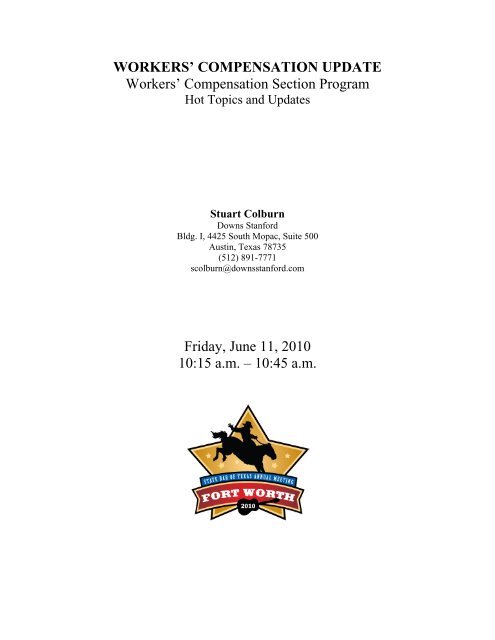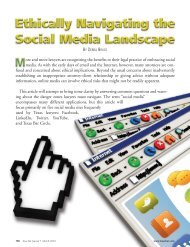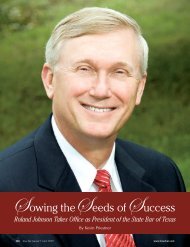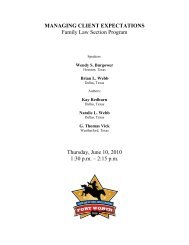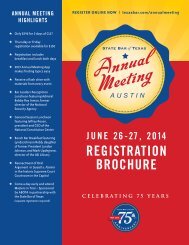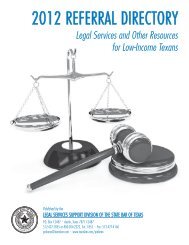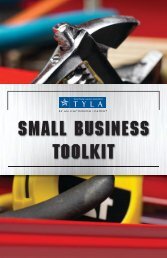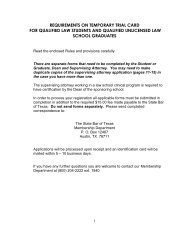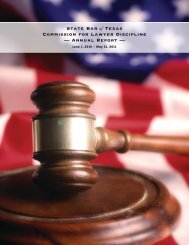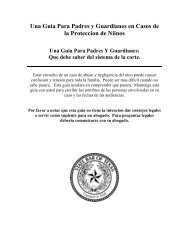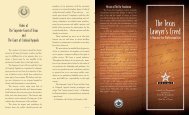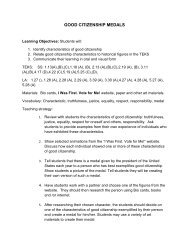WORKERS' COMPENSATION UPDATE ... - State Bar of Texas
WORKERS' COMPENSATION UPDATE ... - State Bar of Texas
WORKERS' COMPENSATION UPDATE ... - State Bar of Texas
You also want an ePaper? Increase the reach of your titles
YUMPU automatically turns print PDFs into web optimized ePapers that Google loves.
WORKERS’ <strong>COMPENSATION</strong> <strong>UPDATE</strong>Workers’ Compensation Section ProgramHot Topics and UpdatesStuart ColburnDowns StanfordBldg. I, 4425 South Mopac, Suite 500Austin, <strong>Texas</strong> 78735(512) 891-7771scolburn@downsstanford.comFriday, June 11, 201010:15 a.m. – 10:45 a.m.
Stuart ColburnAs a shareholder <strong>of</strong> Downs Stanford, Mr. Colburn opened the Austin,<strong>Texas</strong>, <strong>of</strong>fice and manages the TDI - <strong>Texas</strong> Department <strong>of</strong> Insurance,Division <strong>of</strong> Workers’ Compensation Austin board representationservices. He is board certified in Workers’ Compensation Law by the<strong>Texas</strong> Board <strong>of</strong> Legal Specialization. Mr. Colburn is the firm’srepresentative at Division meetings. He is also a certified lobbyist andattends all Legislative meetings and hearings. Mr. Colburn hasextensive experience in all phases <strong>of</strong> dispute resolution before theDivision <strong>of</strong> Worker’s Compensation and in district courts across thestate. He is extremely active in the education <strong>of</strong> both adjusters andemployers for workers’ compensation and bad faith allegations and iscertified by the <strong>Texas</strong> Department <strong>of</strong> Insurance as a continuingeducation provider. Mr. Colburn is the founder and past chair <strong>of</strong> the<strong>State</strong> <strong>Bar</strong> <strong>of</strong> <strong>Texas</strong> Workers’ Compensation Section. He also serves asthe Course Director for numerous programs including the <strong>Texas</strong> <strong>State</strong><strong>Bar</strong>’s Advanced Workers’ Compensation Seminar and <strong>Texas</strong> Workers’Compensation Forum. He serves on the Executive Committee <strong>of</strong> theLexis Nexis advisory board for Larson’s on Workers’ Compensation.He is also on the Advisory Board <strong>of</strong> Employers <strong>Texas</strong> Workers’ CompAlert. A sought-after speaker, Mr. Colburn has delivered over fivehundred speeches regarding Workers’ Compensation.
Case Law and Appeals Panel ReviewBy: Stuart D. ColburnINTRODUCTIONThe Legislature passed major reforms to worker’s compensation law in 2005.The newly created Division <strong>of</strong> Worker’s Compensation assumed the task <strong>of</strong>implementing the reforms and adopting new rules. A summary <strong>of</strong> these changes wasprovided in 2007 and 2008. Significant changes were proposed in 2009. However, thevoter ID issue disposed many <strong>of</strong> those bills. (In fact, a special session was necessaryto reauthorize <strong>Texas</strong> Department <strong>of</strong> Insurance from Sunset).Most stakeholders believe the worker’s compensation climate has improved.Lingering concerns include: (1) adequacy <strong>of</strong> benefits; (2) improved return to workoutcomes; (3) access to medical care; (4) delivery <strong>of</strong> medical care; and a possiblelegislative response to Entergy v. Summers (see below).The DWC is currently studying a closed formulary in response to nationalstatistics that <strong>Texas</strong> is considered a “high cost” state. “Bad faith” litigation dominatesconversation and disagreement within the bar even before a Bexar County jury awarded70 million in damages on denied benefits <strong>of</strong> $9,800. The <strong>Texas</strong> Supreme Court justheard oral arguments in <strong>Texas</strong> Mutual Insurance Company v. Ruttiger, 2008 WL184240 (Tex.App.—Hous. (1 Dist.))Stakeholders can only speculate on whether the <strong>Texas</strong> Supreme Court willoverturn worker’s compensation bad faith; narrow its application; or leave it alone.Case law provided the most interesting changes in the last twelve months.Below is a review <strong>of</strong> some <strong>of</strong> the most interesting cases.****************************************************************************************************
Page 2I.CASE LAW REVIEWA. Exclusivity <strong>Bar</strong>Entergy Gulf Store, Inc. v. Summers, 282 SW 3d 433 (Tex. 2009)Issue: Exclusivity <strong>Bar</strong>The <strong>Texas</strong> Supreme Court holds that a premises owner can be considered a generalcontractor for purposes <strong>of</strong> the exclusivity provisions <strong>of</strong> the Workers’ Compensation Act.The premises owner enjoys the exclusivity bar and is shielded from 3 rd party lawsuits if itprovides workers’ compensation insurance for all the subcontractor employees. The<strong>Texas</strong> Supreme Court’s decision sparked immediate controversy and a response fromthe Legislature. Both political parties seemed united in their resolve to legislativelyoverturn the decision.H.C. Beck, Ltd. v Wise, 284 S.W.3d 349 (Tex. 2009)Issue: Exclusivity <strong>Bar</strong>The property owner operated an Owner Controlled Insurance Program (OCIP). The<strong>Texas</strong> Supreme Court believed the OCIP protected the owner, the general contractor,and all subcontractors. As such, the owner and the general contractor were entitled tothe exclusivity bar.B. WaiverSouthwestern Bell Telephone Co., L.P. v. Mitchell, 276 S.W.3d 443, (Tex. 2008)Issue: WaiverThe Supreme Court overturned Continental Casualty v. Downs, 81 S.W. 3d 803 (Tex.2002) and held a carrier cannot waive its right to dispute a case within the first 60 days.SORM v. Lawton 295 S.W.3d 646 (Tex. 2009)Issue: WaiverThe <strong>Texas</strong> Supreme Court held the carrier cannot waive extent <strong>of</strong> injury. The decisionended the five year Appeals Panel creation <strong>of</strong> a “waiver period” where a carrier couldwaive all diagnoses, if not sufficiently disputed, including those conditions it neverreceived notice or conditions the claimant specifically denied. The court held theAppeals Panel could not apply the 60 day deadline governing compensability to extent<strong>of</strong> injury disputes. Rule 124.3(e), stating that waiver does not apply to extent <strong>of</strong> injurydisputes, and the preamble to the rule make clear the compensability dispute deadline
Page 3does not apply to extent <strong>of</strong> injury disputes. The Court’s dicta stating the carrier has 45days from receipt <strong>of</strong> a medical bill to dispute extent <strong>of</strong> injury probably does not createanother waiver period but may lead to additional litigation.Fire & Casualty Insurance Company <strong>of</strong> Connecticut v. Miranda, 293 S.W.3d 620(Tex.App.–San Antonio, 2009, no pet.)Issue: WaiverThe claimant sustained a right forearm scratch on June 25, 2001. The carrier did notdispute the injury. The claimant underwent a comprehensive health screening at hisemployer’s <strong>of</strong>fice in October and tested negative for Hepatitis C. On February 22, 2002,the claimant tested positive Hepatitis C. DWC and trial court found the carrier waivedits right to dispute Hepatitis C because no dispute was filed within seven days followingwritten notice <strong>of</strong> the original injury even though the claimant did not test positive forHepatitis C for another 8 months. The court distinguished between the claimant’soriginal specific injury and the new occupational disease, Hepatitis C. The occupationaldisease claim started a new 60 day clock to pay or dispute pursuant to Mitchell.C. Expert Medical EvidenceThe City <strong>of</strong> Laredo v. Garza, 293 S.W.3d 625 (Tex.App.–San Antonio, 2009)Issue: Expert EvidenceThe claimant sustained a compensable injury to his knee and ankle when he threwcarpet in a dumpster. He alleged the injury extended to the lumbar spine (herniationsand radiculopathy) and Complex Regional Pain Syndrome (CRPS) (also known asReflex Sympathetic Dystrophy (RSD)). The trial court found in favor <strong>of</strong> the injuredworker and the City <strong>of</strong> Laredo appealed on grounds the plaintiff’s claims required expertevidence to establish causation. Expert evidence is required to prove causation unlessthe injuries (1) are within the common knowledge and experience <strong>of</strong> lay persons; (2)they did not exist before the accident; and (3) appeared after and in close time to theaccident. In this case, the claimant did not report back pain or injury to either theadjuster or the treating doctor for over four months. The treating doctor testified hewould expect an injured worker to complain <strong>of</strong> pain within one week <strong>of</strong> a specific injurycausing herniations. Without expert medical evidence, the appellate court foundinsufficient evidence the injury extended to the spinal injuries and CRPS.
Page 4Simpson v. <strong>State</strong> Office <strong>of</strong> Risk Management, 276 S.W.3d 39 (Tex.App.–El Paso,2008, pet. den’d)Issue: Expert Medical EvidenceThe claimant alleged typing 65% - 90% <strong>of</strong> the day caused a repetitive trauma claim tohis upper extremities. The parties did not individually list the diagnosis claimed ordisputed as part <strong>of</strong> the alleged compensable injury. Instead, the issue was whether theclaimant sustained a compensable repetitive trauma claim. DWC held for the claimantbut the jury found for SORM. The court held repetitive trauma claims were beyond thescope <strong>of</strong> knowledge for a lay person. Therefore, the party with the burden <strong>of</strong> pro<strong>of</strong> (inthis case, SORM) must present expert evidence the claimant did not sustain a repetitivetrauma injury. The injured worker’s expert testified to trigger finger, carpal tunnelsyndrome (CTS), tendonitis, and tenosynovitis. SORM’s expert only negated CTS (andto some extent tendonitis). The court held the carrier failed to provide sufficient expertevidence to establish its burden that each diagnosis (namely tenosynovitis andtendonitis) was not related. Thus, the claimant prevailed on the issue <strong>of</strong> acompensable repetitive trauma claim.W.C. Larock, D.C., P.C. v. Smith, (08-07-00346-CV) (Tex.App.-El Paso, 2010)Issue: Expert Medical EvidenceAn injured worker sued her health care providers for medical malpractice, and heremployer intervened. After surgery, the claimant was instructed to perform knee-tochestexercises. She alleged immediate onset <strong>of</strong> pain and a subsequent MRIdemonstrated a recurrent herniation requiring a second spinal surgery. The jury foundfor the injured worker. The Court <strong>of</strong> Appeals reversed finding the plaintiff did notpresent expert evidence establishing causation with reasonable medical probability asopposed to speculation, conjecture, surmise or possibility. Plaintiff’s expert testimonyonly rose to the level <strong>of</strong> possibility. The court writes, “Here, Smith was suffering from apre-existing condition. Additionally, the testimony established that the timing <strong>of</strong> theonset <strong>of</strong> pain that Smith experienced did not mean that the disc herniated at themoment Gallardo administered the knee-to-chest exercise; rather, the only inferencethat could be drawn was that the disc contacted the nerve at that point in time. The discitself may well have herniated before then. “The court explained the expert need not usemagic words but the substance <strong>of</strong> his opinion must be based on reasonable medicalprobability.” The court concludes, “Similarly, although an expert may use the phrase"reasonable probability," his testimony may still be insufficient to establish the samewhen the substance <strong>of</strong> his testimony raised only mere possibilities, speculation, andsurmise.”
Page 5D. CompensabilityAmerican Protective Insurance Company v. Leordeanu, 278 S.W. 3d 881(Tex.App.–Austin, 2009)Issue: Dual Purpose DoctrineThe Court <strong>of</strong> Appeals established that a claimant must satisfy both prongs <strong>of</strong> <strong>Texas</strong>Labor Code §401.011(12)(B) for an injury to be compensable under the Dual PurposeDoctrine. The Dual Purpose Doctrine requires (1) travel to the place <strong>of</strong> injuryoccurrence would have been made even had there been no personal or private affairs<strong>of</strong> the employee to be furthered by the travel and (2) the travel would not have beenmade had there been no affairs or business <strong>of</strong> the employer to be furthered by thetravel. The court requires the plaintiff satisfy the Dual Purpose Doctrine test even if a§401.011(12)(A) exception applies (including transportation furnished or under thecontrol <strong>of</strong> the employer or the Special Mission Doctrine). In this case, the claimant is apharmaceutical sales representative who worked out <strong>of</strong> her house. She was drivingfrom a work event to a storage facility where she kept business materials. Therefore,she was not on her way home at the time <strong>of</strong> the accident. Plaintiff contends that even ifshe was on her way “home” she is still entitled to workers’ compensation benefits sinceshe <strong>of</strong>fices out <strong>of</strong> her apartment.Gray Insurance Co. v. Jones, 2008 WL 5690565 (Tex. App. Beaumont, 2009, pet.den’d)Issue: Personal Comfort DoctrineThe claimant was injured picking up his own garbage in the employer-provided drillingcrew house approximately 10 hours after his shift ended. The court <strong>of</strong> appeals reversedthe jury finding in favor <strong>of</strong> the injured worker noting the Personal Comfort andConvenience doctrine allows small and insignificant deviations from employment butyou must actually be in the course and scope <strong>of</strong> employment prior to providing for yourown personal comfort and convenience. The court did not discuss the application <strong>of</strong> theContinuous Coverage Principle (allowing 24/7 coverage when an employee’s workrequires travel away from home).E. Lifetime Income BenefitsInsurance Company <strong>State</strong> <strong>of</strong> Pennsylvania v. Muro, 285 S.W.3d 524 (Tex.App.–Dallas, 2009, pet filed)Issue: Lifetime Income BenefitsThe claimant sustained an injury to the spine but no injury to the claimant’s feet or righthand. The court <strong>of</strong> appeals determined the injuries to the neck, shoulder, low back, and
Page 6hips affected the condition <strong>of</strong> one hand and one foot satisfying the statute. Therefore,the injured worker is entitled to lifetime income benefits for the permanent loss <strong>of</strong> use <strong>of</strong>one foot and/or one hand despite the fact there was no injury to the hand or foot.F. Attorney FeesDiscovery, Property & Casualty Insurance Co. v. Tate, 298 S.W.3d 249 (Tex.App.-San Antonio, 2009)Issue: Attorney FeesAt trial, the claimant prevailed on two quarters <strong>of</strong> supplemental income benefits (anamount less than $10,000). The court awarded attorney’s fees in excess <strong>of</strong> $100,000and additional attorney fees for the pursuit <strong>of</strong> attorney fees. The majority held thecarrier was entitled to a jury issue and determination on the amount <strong>of</strong> reasonable andnecessary attorney fees. The dissent believed Discovery had a right to a plenaryhearing on the attorney fees but no jury question. The court also held an attorney maynot secure additional attorney fees in pursuit <strong>of</strong> attorney fees.G. Stop/Loss<strong>Texas</strong> Mutual Insurance Co. v. Vista Community Medical Center, LLP, 275 S.W.3d538 (Tex.App.–Austin, 2008, pet. filed)Issue: Stop lossThe court <strong>of</strong> appeals determined hospitals may not use the $40,000 stop/loss threshold(the carrier owes 75% reimbursement <strong>of</strong> all audited charges that exceed $40,000)unless the provider established the audited charges exceeded $40,000 and the servicesprovided were unusually costly or extensive.H. Bad Faith<strong>Texas</strong> Mutual Ins. Company v. Morris, 287 S.W.3d 401 (Tex.App.–Houston [14 thDist.], 2009)Issue: Bad FaithThe claimant sustained an injury in 2000. The carrier was not aware <strong>of</strong> any disability ormedical treatment for two years until the claimant sought emergency spinal surgery in2003. Plaintiff’s expert asserted the carrier must conduct a three point contact in 2003when they became aware <strong>of</strong> the need for emergency surgery. The adjuster filed adenial after speaking with the claimant’s former employer. The adjuster did not speakwith the claimant, treating doctor, or the surgeon. Plaintiff’s expert also testified thecarrier must consider the aggravation theory (carrier must pay if the claimed injury isjust a “1%” cause <strong>of</strong> the need for surgery). The court <strong>of</strong> appeals accepted the plaintiff’s
Page 7expert opinions (three point contact three years after the initial investigation and the 1%aggravation standard) in its reasoning upholding a finding <strong>of</strong> bad faith.Cunningham Lindsey Claims Management Inc. v. Snyder, 291 S.W.3d 472(Tex.App.-Houston [14th Dist.], 2009)Issue: Bad FaithThe jury found “bad faith” and awarded 4.3 million dollars in damages. However, thecourt <strong>of</strong> appeals reversed, finding the plaintiff did not exhaust his administrativeremedies. The carrier originally denied both the original injury and the first request forsurgery. The claimant prevailed on compensability at a Contested Case Hearing. Theclaimant did not pursue medical dispute resolution <strong>of</strong> the spinal surgery denial. Thedoctors filed a second request for spinal surgery that was approved by the carrier. Thecourt <strong>of</strong> appeals held the claimant was essentially pursuing a denial <strong>of</strong> the claimant’ssurgery, not a denial <strong>of</strong> compensability. Since the first denial <strong>of</strong> surgery was neverpursued, the claimant did not exhaust his administrative remedies.II.Appeals Panel DecisionsA. CompensabilityAPD 091309Issue: IntoxicationThe decedent’s post mortem blood and urinalysis showed marijuana. Based upon thepositive test, the claimant is presumed intoxicated. To overcome the presumption andsatisfy the burden <strong>of</strong> pro<strong>of</strong>, the claimant presented evidence from a doctor citing a textbook on forensic pathology that “Drug levels and post mortem exams is totally invalidwhen testing for cannabis, (THC) and its metabolites due to the rapid redistribution fromstorage issues such as fat in the body.” The Appeals Panel reversed holding that thedecedent’s expert only challenged the drug screen itself but did not present anyevidence the claimant did have the normal use <strong>of</strong> his mental or physical faculties at thetime <strong>of</strong> the incident. There was no other evidence the claimant had the normal use <strong>of</strong>his mental or physical faculties. The injury itself was caused when the claimant wasdriving a motor vehicle and drifted into an oncoming lane. The Hearing Officer’s findingthat the injury was compensable is reversed and rendered.
Page 8B. ExtentAPD 090633Issue: ExtentThe Hearing Officer found the claimant sustained a compensable injury which extendedto and included MRSA. The Appeals Panel reversed the finding <strong>of</strong> MRSA noting therewas “no expert medical evidence presented to establish the claimant was infected withMRSA at the workplace or due to a sticking/bite incident.”APD 091367Issue: PsychologicalClaimant sustained a compensable injury in the course and scope <strong>of</strong> employment. Thetreating doctor believed the claimant appeared to have situational reactive depressionissues. He recommended a psychological evaluation before surgery. The HearingOfficer found the claimant had a reactive depression related to the compensable injury.Appeals Panel noted there is not a diagnosis <strong>of</strong> psychological disease or disorder.Further, there is no evidence the claimant was treated for reactive depression or anystatement from any doctor that the compensable injury was a cause <strong>of</strong> the reactivedepression. The designated doctor did not mention or rate any psychologicalproblems. Therefore, the Appeals Panel reversed and held the compensable injurydoes not extend to and includes psychological problems.APD 091423Issue: Extent <strong>of</strong> InjuryAt a Benefit Review Conference, the Hearing Officer indicated she would write a letter<strong>of</strong> clarification. Subsequently, she personally spoke with the designated doctor whoagreed the injury was only a sprain/strain. Therefore, no letter <strong>of</strong> clarification wasdrafted. The Appeals Panel stated, “The Hearing Officer erred by failing to allow theparties an opportunity to see or hear exactly what additional information was given tothe doctor and exactly how, or if, the designated doctor reconciled his conflictingopinions.” Therefore, the Appeals Panel reversed and remanded to the Hearing Officerto write a written letter <strong>of</strong> clarification.APD 091640Issue: Follow-on InjuryThe claimant sustained a compensable injury in the course and scope <strong>of</strong> hisemployment. Thereafter, the claimant dislocated his right shoulder when he reachedbehind the backseat to separate his two children from each other while driving. TheHearing Officer found the compensable injury extended to and included the dislocated
Page 9right shoulder because the original injury reduced his resistance and increased the risk<strong>of</strong> a re-dislocation. The Appeals Panel reversed. A follow-on injury must naturally flowfrom the compensable injury. The Hearing Officer must consider “whether there is adistinct, non work-related activity involved in the subsequent injury, whether a distinctdifferent body part was injured, the length <strong>of</strong> time between the injuries, whether therewas only a degree <strong>of</strong> weakening or lower resistance, and whether there was medicalevidence to establish causation. APD 00594.”C. Disability/TIBSAPD 090558Issue: DisabilityClaimant sustained a right ankle injury and was placed on restrictions. No doctorreleased claimant back to work full duty. However, she was able to return back to workwith her employer the remainder <strong>of</strong> her contract term. After her contract ended, shebegan searching for other work. The Hearing Officer found the claimant did not havedisability. The Appeals Panel disagreed holding that no medical record reflected theclaimant was able to return to work full duty and therefore the Hearing Officer must finddisability as a matter <strong>of</strong> law.APD 091194Issue: DisabilityThe Hearing Officer found disability beginning on March 29, 2009 through the date <strong>of</strong>the Contested Case Hearing (CCH). However, the claimant worked in a light dutyposition from February 9 to February 17, 2009. She went to her treating doctor onFebruary 17, 2009 who took her completely <strong>of</strong>f work and referred her to an orthopedicsurgeon. The Appeals Panel found the claimant suffered disability beginning onFebruary 18, 2009 through the date <strong>of</strong> the CCH, stating that a claimant is disabled ifthere is a medical report indicating anything other than a full duty return to work.APD 091260Issue: DisabilityThe Hearing Officer found disability ended. Allegedly, the employer told the claimantthey could no longer accommodate his restrictions. The Appeals Panel held a light dutyrelease is evidence that disability continues. Because the claimant testified that he wasunable to reform his regular duties during the disputed period, the Appeals Panel foundthe claimant is presumed to be entitled to temporary income benefits.APD 091511Issue: Disability
Page 10The Appeals Panel affirmed the decision that the claimant’s compensable injuryextended to and included a disc protrusion at L4-5 but not lumbar radiculopathy or adisc protrusion at L5-S1. The claimant’s doctor returned the claimant to regular work.Subsequently, the doctors took the claimant <strong>of</strong>f work for the non-compensable lumbarradiculopathy and surgery at L5-S1. Therefore, the Appeals Panel reversed thedisability determination finding no medical evidence to support the claimant was unableto obtain or retain employment due to the compensable injury at L4-5.APD 091807Issue: TIBSAt the first Contested Case Hearing, the parties stipulated the average weekly wagewas $677.38. The Hearing Officer found the post injury earnings (PIE) pursuant to thebona fide job <strong>of</strong>fer (BFOE) were $440 a week. This finding was not appealed andtherefore became final. The carrier argued the post injury earnings (PIE) should be theBFOE amount <strong>of</strong> $440.00 per week. However, the claimant did not actually work norwas paid at $440.00 a week for every week in consideration. The Appeals Panel writes,“The evidence indicates that the claimant was not able to work 40 hours per week forvarious reasons including weather conditions and economic conditions that affected theemployer.” The Appeals Panel recalculated the benefits owed. Even though the carrierappealed the amount <strong>of</strong> TIBS owed ($5,032.96), the Appeals Panel reversed andordered the carrier to pay more money to the injured worker: $5,239.85. Therefore, theamount <strong>of</strong> the BFOE is not considered PIE when the claimant actually worked. If theclaimant did not work the full hours pursuant to the bona fide job <strong>of</strong>fer due to weatherand conditions affecting the employer’s financial health.D. MMI/IRAPD 090639Issue: IRRadiculitis is not radiculopathy for purposes <strong>of</strong> calculating a proper impairment rating.APD 091039Issue: Maximum Medical ImprovementThe Hearing Officer sent the designated doctor a letter <strong>of</strong> clarification indicating theclaimant reached statutory MMI. The designated doctor issued a report with the givenstatutory MMI date and rendered a 17% impairment rating. The Appeals Panel believedthe designated doctor did not certify statutory MMI based on his medical opinion butrather by the instructions given by the Hearing Officer. Thus, they reversed the findings<strong>of</strong> maximum medical improvement.
Page 11APD 091210Issue: Disqualifying AssociationThe designated doctor was associated with an organization (SWS). A peer reviewreport was authored by a doctor which had the same street address, suite number,telephone number, and fax number as the designated doctor. The peer review reportsupported the designated doctor’s opinions and the designated doctor failed to changehis opinion in three letters <strong>of</strong> clarification. Claimant’s attorney called himself as awitness and testified that both the designated doctor and the peer review doctor camefrom SWS. The claimant’s attorney also testified the carrier used SWS for its requiredmedical examination physician although the address was different. The Appeals Panelrelied on the definition <strong>of</strong> disqualifying association found in Rule 180.21 and AppealsPanel Decision 960569 to hold there is a disqualifying association between the peerreview physician and the designated doctor based on their shared <strong>of</strong>fice space,telephone number, and fax number.APD 091354Issue: Impairment RatingThe Hearing Officer found in accordance with the treating doctor’s report. However, theAppeals Panel reversed based on Rule 130.1(d)(1)(B) because the treating doctor’sDWC-69 was not accompanied by a narrative report that provided: (1) an explanation <strong>of</strong>the analysis performed to determine MMI; (2) a narrative history <strong>of</strong> the medical conditionthat outlines the course <strong>of</strong> the injury and correlates the injury to the medical treatment;and (3) the specific body parts considered by the treating doctor and certifying MMI andassessing an impairment rating. The Appeals Panel further noted the doctor does notdescribe how the clinical findings are related to and compared with the applicablecriteria the AMA Guidelines pursuant to Rule 130.1. Therefore, the Appeals Paneladopted the RME’s report.APD 091375Issue: Impairment RatingThe Hearing Officer found certain conditions related to the compensable injury andcertain conditions were not related. However, none <strong>of</strong> the impairment ratings <strong>of</strong>fered byany <strong>of</strong> the doctors either rated the entire compensable injury or rated conditions thatwere not part <strong>of</strong> the compensable injury. Therefore, the case was remanded for theHearing Officer to contact the designated doctor and seek an opinion as to the properimpairment rating for the compensable injury as <strong>of</strong> the date <strong>of</strong> maximum medicalimprovement.APD 091437Issue: Impairment Rating
Page 12The designated doctor felt claimant gave poor effort in range <strong>of</strong> motion exercises butalso felt loss <strong>of</strong> strength was attributable to decreased use <strong>of</strong> the right wrist. However,the designated doctor improperly calculated the impairment by combining the upperextremity impairment with the right wrist impairment. The Appeals Panel felt they couldcalculate the impairment rating without need <strong>of</strong> a letter <strong>of</strong> clarification since it was simplya mathematical formula. Therefore, the range <strong>of</strong> motion for the upper extremity iscombined with the wrist extremity and then using the combined value chart to arrive at a21% impairment rating (which is more than 20% found by the Hearing Officer andargued by the claimant). Thus, carrier’s appeal increased the impairment rating.APD 091660Issue: Designated Doctor: Disqualifying AssociationThe claimant’s attorney called himself as a witness to testify the Designated Doctor andRequired Medical Examination (RME) doctor share the same <strong>of</strong>fice space, recordkeeping, billing, collection, and 100% clerical support. They are both also employed bya certain healthcare provider. The Appeals Panel noted that Rule 180.21(a)(2) definesa qualifying association as “any association that may reasonably be perceived ashaving potential to influence conduct or decision <strong>of</strong> a doctor.” The Appeals Panelbelieves this definition includes any agreement for space, personnel services, or anyother services related to the management <strong>of</strong> a doctor’s practice.APD 091787Issue: Extension <strong>of</strong> MMI, and Impairment RatingThe Appeals Panel reversed the Hearing Officer’s findings and remanded further actionwith specific instructions. Those instructions include determining a date for anextension <strong>of</strong> MMI date due to spinal surgery. The Hearing Officer is then to inform thedesignated doctor <strong>of</strong> the new MMI date, provide all medical records including thoserecords <strong>of</strong> the claimant’s alleged major depressive disorder and cervical spine, andseek an opinion as to the proper impairment rating possibly using alternate certificationsfor anxiety and cervical spine.
Page 13APD 091820Issue: Impairment RatingThe designated doctor awarded a 4% impairment rating though the claimant underwentshoulder surgery. Table 27 (AMA Guides) provides an impairment rating forarthroplasty and range <strong>of</strong> motion loss. Failing to give an impairment rating for both is afailure to rate the entire injury.APD 091822Issue: Impairment RatingThe second designated doctor awarded a 10% impairment rating based on Table 75using the ROM model. Citing Appeals Panel 061529-5, the Appeals Panel found thedesignated doctor did not explain why the DRE model was not used. The record alsodid not include a DWC-69.APD 091960Issue: Maximum Medical ImprovementThe treating doctor certified maximum medical improvement with a 1% impairmentrating. The designated doctor believed the claimant’s injury extended to and included atibial collateral ligament which the claimant had not yet been treated. He changed theMMI date from May 12, 2008 to August 12, 2008. However, he did not complete aDWC-69. The Division held that Rule 130.1 requires a certification <strong>of</strong> maximum medicalimprovement and determination <strong>of</strong> an impairment rating requires completion, signing,and submission <strong>of</strong> a DWC-69 and narrative report. Because the designated doctor didnot issue or sign a DWC-69, the certification <strong>of</strong> maximum medical improvement andimpairment rating is invalid. The treating doctor’s certification <strong>of</strong> MMI and IR isovercome by the designated doctor even though there is no DWC-69 since thedesignated doctor did not believe the claimant reached maximum medical improvementon May 12, 2008. Moreover, the designated doctor felt the claimant required additionaltreatment for the collateral ligament.E. 90 Day FinalityAPD 091106Issue: 90 Day ProvisionsThe Hearing Officer found the carrier did not send the PLN-3 and DWC-69 by verifiablemeans. The evidence included a United <strong>State</strong>s Postal Service tracking confirmationindicating the envelope had been delivered and the adjuster notes indicating a DWC-69and DWC PLN-3 was sent to the claimant by certified and regular mail referencing theUnited <strong>State</strong>s Postal Service tracking form. There is no evidence that either thecertified or regular mail was returned undeliverable. Citing Appeals Panel Decision
Page 14070533-S, the DWC found the carrier submitted the first certification <strong>of</strong> maximummedical improvement and impairment rating to the claimant by certified mail whichshowed delivery to the claimant who did not dispute within 90 days.APD 091827Issue: 90 Day FinalityThe Appeals Panel found reports from three separate doctors (including the carrier’sRME) compelling medical evidence <strong>of</strong> inadequate medical treatment to the elbow andlow back. The reports state the claimant needed a referral to an elbow specialist. Thus,the first certification was not final.APD 092051Issue: 90 day ruleThe Hearing Officer found that the first certification <strong>of</strong> maximum medical improvementand impairment rating did not become final. The doctor who assigned the firstimpairment rating examined the claimant and reviewed the medical reports including anMRI. The narrative report found no objective findings or significant signs <strong>of</strong>radiculopathy. At that time, no doctor diagnosed radiculopathy and the claimant hadreturned back to work lifting approximately 50 lbs. Thereafter, the claimant underwentadditional testing including an EMG/NCV showing acute L5 radiculopathy. The doctorsdiagnosed clinical signs <strong>of</strong> radiculopathy and the claimant underwent lumbar surgery atL5-S1. Citing Appeals Panel Decision No. 052666-S, the Appeals Panel states that“just because there is subsequent surgery or treatment which proves beneficial to thepatient does not automatically, or in this case, amount to inadequate treatment.”Applying the rationale <strong>of</strong> APD 052666-S, the Appeals Panel writes, “In this case, thereis no compelling medical evidence that any <strong>of</strong> the claimant’s treatment prior to Dr. G’scertification on March 18, 2008, was improper or inadequate.” The Appeals Panelnoted the lack <strong>of</strong> any medical evidence the claimant received improper or inadequatetreatment for his injury, or the failure to perform spinal surgery earlier amounted toimproper and inadequate treatment.F. SIBSAPD 091146Issue: Supplemental Income Benefits WaiverThe Division held the claimant was not entitled to the first quarter <strong>of</strong> supplementalincome benefits (SIBs). The claimant’s attorney submitted an application for the secondquarter to the carrier who did not dispute that quarter within ten days. The carrier reliedupon Appeals Panel Decisions stating that it was not required to dispute subsequentquarters <strong>of</strong> supplemental income benefits when the Division denied the first quarter.The Appeals Panel held that if the previous quarter is “actively in dispute” at the time the
Page 15carrier receives the application for the second quarter, the carrier must dispute thatquarter by requesting a Benefit Review Conference (BRC) within 10 days or it waives itsright to dispute that quarter.APD 091318Issue: Supplemental Income BenefitsThe physician’s assistant believed the claimant could not return to any full duty work forat least six months. The Appeals Panel held that the physician’s assistant is not adoctor and therefore the report is not a narrative report consistent with Rule130.102(d)(4).APD 091318Issue: Supplemental Income BenefitsThe treating doctor felt his twenty-five years <strong>of</strong> experience and role as a designateddoctor supported his opinion the claimant is entitled to supplemental income benefits.The Appeals Panel found that such report does not explain why the claimant’s medicalcondition caused a total inability to work.APD 092043Issue: SIBSThe Hearing Officer found the claimant was entitled to the 2 nd and 3 rd quarter <strong>of</strong>supplemental income benefits. The claimant did not make an active work search effortdocumented by job applications during the two qualifying periods. However, the DWC-52 applications have attached sheets showing job contacts through the <strong>Texas</strong>Workforce Commission (TWC). However, the claimant only began working with TWC inthe middle <strong>of</strong> the third quarter. The claimant cannot testify to additional job searchesthat were not documented on the initial SIBS application, citing Appeals Panel DecisionNo. 000505. The Appeals Panel writes, “We have held that the documentationrequirement <strong>of</strong> Rule 130.102(e) is mandatory and undocumented employment contactsmay not be considered in arriving at the good faith determination.” Therefore, theclaimant was not entitled to supplemental income benefits for the 2 nd and 3 rd quarters.G. MiscAPD 090991Issue: Issues Reported Out <strong>of</strong> a BRCThe issue before the Hearing Officer was whether the claimant’s compensable injuryextended to and included spondylolysis. The Hearing Officer found the compensableinjury did extend to and include spondylolysis, degenerative disk disease, andtrochanteric bursitis. The Appeals Panel found that the diagnoses <strong>of</strong> degenerative disk
Page 16disease and trochanteric bursitis were not found in the issue certified at the BenefitReview Conference and therefore struck that portion <strong>of</strong> the Hearing Officer’sdetermination as surplusage.APD 091039Issue: Res JudicataIn a previous Contested Case Hearing, the Hearing Officer found the claimant did notsustain a compensable injury but the carrier waived its right to dispute the injury. In thebackground information, the Hearing Officer found the claimant’s compensable injurywas to her low back and right knee. In the instant Contested Case Hearing, the issue iswhether a compensable injury extended to and included other conditions including theleft knee. A self-insured argued that the doctrine <strong>of</strong> res judicata prevented the HearingOfficer from finding that the compensable injury extended to and included the left knee.The Appeals Panel agreed and limited the compensable injuries to the low back andright knee.APD 091047Issue: Adding an IssueThe issue before the Hearing Officer was whether the claimant’s compensable injuryextended to include lumbar instability. However, the Hearing Officer also found that afive millimeter retrolisthesis was not related to the compensable injury. The BenefitReview Conference report did not list retrolisthesis as an extent <strong>of</strong> injury issue. TheAppeals Panel noted that parties may consent to add an issue. Consent can be inferredby parties actually litigating the issue. In this case, the parties did not discuss, argue orotherwise litigate retrolisthesis. Furthermore, the Appeals Panel noted there was nodiscussion how retrolisthesis either differed from or was similar to instability.APD 091229Issue: Judicial NoticeThe Hearing Officer found the carrier waived its right to dispute the claim. The carrierinitially began making temporary income benefits when it received notice <strong>of</strong> the injury.The Appeals Panel found that the carrier received notice at least by July 19, 2007 (asevidenced by the PLN-1 indicating it received notice on that day). The carrier’s PLN-1was signed on August 14, 2007 but was not date stamped. The carrier asked theHearing Officer to take judicial notice <strong>of</strong> when the PLN-1 was filed with the Division.The Hearing Officer found waiver. Citing the Appeals Panel Decisions 050833 and030295, the Appeals Panel reversed and asked the Hearing Officer to take judicialnotice <strong>of</strong> the PLN-1 filing date and determine if the carrier timely disputedcompensability.APD 091328
Page 17Issue: Request for Continuance and Admission <strong>of</strong> EvidenceAfter the Benefit Review Conference, the claimant filed a motion for continuance so theclaimant could be examined by a designated doctor and then <strong>of</strong>fered the designateddoctor’s examination report into evidence over the carrier’s objections. The AppealsPanel found that the Hearing Officer’s granting <strong>of</strong> the motion for continuance and theadmittance into evidence <strong>of</strong> the designated doctor’s report was not an abuse <strong>of</strong>discretion. The Appeals Panel also noted the Hearing Officer had a duty to fullydevelop the record.APD 091513Issue: Contested Case Hearing ProceduresThe claimant provided rebuttal testimony. The Hearing Officer did not allow the carrieran opportunity to cross examine the claimant on this additional testimony. Theclaimant’s testimony was a “significant consideration in the resolution <strong>of</strong> the disputedissues <strong>of</strong> compensability and disability before the Hearing Officer.” Therefore, theAppeals Panel held the Hearing Officer committed error by allowing the claimant topresent additional rebuttal testimony without providing the self-insured an opportunity tocross examine the claimant regarding the additional testimony.APD 091728Issue: Issues Reported at BRCThe issue reported out <strong>of</strong> the BRC was whether the compensable injury extended to themedial meniscal tear. The Hearing Officer made a finding <strong>of</strong> fact the injury extended toa right knee internal derangement. The parties did not actually litigate the issue. TheAppeals Panel overturned this finding <strong>of</strong> fact.APD 091971Issue: DWC-41 Claim for Compensation FormThe claimant stepped on a sharp object aggravating his pre-existing diabetes andunderwent a partial amputation <strong>of</strong> his left foot. The claimant filed a DWC-41 with theDivision <strong>of</strong> Workers’ Compensation more than one year after the date <strong>of</strong> injury. Theemployer was not notified <strong>of</strong> the claimed injury until after the DWC-41 was filed with theDivision. The Hearing Officer found the claimant’s obligation to file a DWC-41 withinone year was tolled pursuant to <strong>Texas</strong> Labor Code section 409.008. The AppealsPanel writes, “In the instant case, the employer was not required to file a DWC-1pursuant to Section 409.005 before the claimant was required to file his DWC-41because the employer did not have notice or knowledge <strong>of</strong> the claimed injury until afterthe claimant filed his claim on April 28, 2009.” Thus, the tolling provisions do not applyunless there is a duty to file the DWC-1. Since there was no duty to file the DWC-1 by
Page 18the employer, the claimant still had the obligation <strong>of</strong> filing the DWC-41 within one year.Because he failed to do so, the tolling provisions did not attach.H. WaiverAPD 090644Issue: Claimant WaiverThe Hearing Officer found claimant waived his right to activate a dispute or challengethe carrier’s denial <strong>of</strong> certain extent <strong>of</strong> injury issues relying upon Appeals PanelDecision 951494. The Appeals Panel reversed holding “to hold otherwise woulddeprive claimants <strong>of</strong> rights specifically afforded to them under the 1989 Act.” Theclaimant correctly noted in his appeal there is no statutory authority for a timeframe forthe claimant to pursue an extent <strong>of</strong> injury dispute.APD 091260Issue: WaiverThe Hearing Officer found the self-insured waived its right to dispute certain extent <strong>of</strong>injury diagnoses. However, the self-insured filed a timely denial disputing the entireclaim. The Appeals Panel stated, “Because the self-insured timely disputed that anyinjury occurred, there could be no waiver under §409.021 regarding an injury that waslater determined through dispute resolution to be compensable.”The court reversed both the summary judgment and the order for sanctions.The Appeals Panel reversed the following cases <strong>of</strong> waiver based on the SORM v.Lawton decision:APD 091106APD 091156APD 091188APD 091210APD 091230APD 091242APD 091292APD 091344APD 091380


